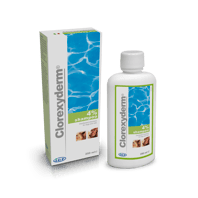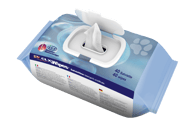
Skin Infections in Companion Animals
Atopic dermatitis is a common skin disease characterized by excessive itchiness (pruritis), and it may affect as much as 10-15% of the companion animal population.
Common Causes of Skin Infections in pets
The most frequent culprits include Staphylococcus species, Malassezia yeast, and dermatophytes. These microorganisms are often opportunistic, meaning they take advantage of a weakened skin barrier or an imbalanced microbiome.
Factors contributing to skin infections include:
- Allergies (food, environmental, or flea allergies) that lead to excessive scratching and irritation
- Endocrine disorders such as hypothyroidism or Cushing’s disease
- Poor hygiene or excessive moisture leading to bacterial or yeast overgrowth
- Parasitic infestations, such as fleas, mites, or ticks
- Trauma or wounds that compromise the skin’s natural defences.
The Link Between Skin Infections and Allergies
Pets with allergies often suffer from recurrent skin infections due to chronic inflammation and scratching. When this occurs, bacteria and yeast can proliferate, leading to infections that require intervention. Addressing the underlying allergy is crucial to breaking the cycle of infection and discomfort.
In addition, studies have shown that allergic animals often have a compromised skin barrier, making them more susceptible to infections. Research indicates that dogs with atopic dermatitis have reduced levels of ceramides, which are essential lipids that help maintain skin integrity (Marsella et al., 2012). This deficiency allows allergens, bacteria, and yeast to penetrate more easily, exacerbating skin inflammation and increasing the risk of secondary infections. Strengthening the skin barrier with topical treatments, moisturizers, and antimicrobial support is critical in managing these patients effectively.
-
.jpg)
Redness is a common sign of an infection
The Importance of Prevention
Preventive care is essential in managing skin infections and reducing the overuse of antibiotics, which can contribute to antimicrobial resistance. Skin care products, such as shampoos, foams, wipes, etc, play a crucial role in maintaining skin health and preventing minor imbalances from escalating into more serious infections. These products help by:
- Restoring skin barrier function through moisturizing and repairing ingredients
- Balancing the skin microbiome to prevent harmful bacterial overgrowth
- Reducing inflammation and itching to minimize self-trauma
- Providing antimicrobial support without contributing to antibiotic resistance
Product selection for skin infections
When dealing with skin infections in pets, having the right products readily available can help manage symptoms, support healing, and maintain skin health. Here are the products to keep on hand:
Clorexyderm 4% Shampoo
...is an antimicrobial shampoo and solution formulated to help manage bacterial and fungal skin imbalances in pets. Enriched with 4% chlorhexidine, it provides powerful antiseptic action while being gentle on the skin.
CLX Wipes
...are practical, ready-to-use cleansing wipes designed to support pets with skin imbalances. Enriched with chlorhexidine (antiseptic), climbazole (antifungal), and Tris-EDTA, these wipes help maintain skin hygiene by helping to controlling microorganisms’ overgrowth.
Perfect for daily use on paws, skin folds, and localized areas prone to irritation or infection.
Dermoscent® Pyo range
The Dermoscent® PYO range is designed to support pets with skin imbalances caused by microbial overgrowth. Formulated with natural antimicrobial ingredients, it helps purify the skin, maintain a healthy microbiome, and reinforce the skin barrier. Ideal for preventive care on a regular basis. It includes for example a schampoo, spot ons and a foam.